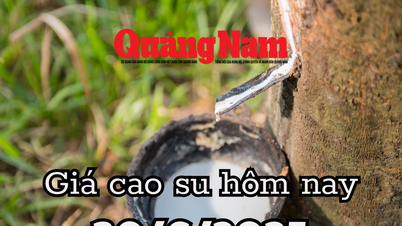His poems appear quite regularly in newspapers and magazines from the central to local levels… But perhaps for a writer, the greatest happiness is that their work does not fall into oblivion. Nguyen Ngoc Hanh believes: “Writing poetry is not about hoping to be remembered forever, but if someone remembers a poem, even a single line of my poetry, that is a great joy.”
Getting someone to remember a poem, or even just a line of one, is not easy at all. The memorization of poetry is different from the memorization of prose.
Unlike prose, ancient poets composed poetry primarily based on the laws of memory. Of course, not every poem written according to these laws of memory is good, but most of the good poems throughout history have been easy to memorize.
Scrolling through dozens of articles about his poetry, I noticed that the most frequently quoted line is: "I once lived in the village / Now the village lives in me" (Village). This proves that good poetry still has a common denominator.
The author concisely, simply, and philosophically portrays the feelings of those who are far from home, making the story instantly memorable for anyone who reads it.
I don't know if writer Lê Bá Thự has read these two lines of poetry, but in his poem "I Write 'Me and My Village'," he has a similar line: "I am in the village and the village is in me." It's similar, not exactly the same.
Prose and poetry sometimes differ by only one word. "To be" is a static state, "to live" is a dynamic state. "I live in the village" evokes so many memories. "The village lives in me" evokes so much affection and longing.
Looking at Nguyen Ngoc Hanh's poetry as a whole, I find that he is more successful in the traditional style. His poems about the countryside also fit this traditional style better.
Hanh uses folk songs and ballads very flexibly and creatively. These are the verses he wrote about his mother: "Keep the wet spot where mother lies for me / Send the wind that blows through the gaps in the fence during labor / The cold on each patched mat / Mother leaves the dry spot for the baby to roll on" (The Wet Spot Where Mother Lies).
In the last line of the poem, he skillfully uses the folk song: "Raising a child, one doesn't mind one's own body / The mother lies on the wet side, the child rolls on the dry side ."
Upon carefully examining Nguyen Ngoc Hanh's poems written in the traditional style, I encountered many novel ways of expression, preventing his poetry from becoming outdated or clichéd like that of many authors who follow this approach.
In the poem "Moon Upstream," Hanh wrote: I rest my head on December / Lying curled up / Listening to the sad sound of rain . In the poem "Paying Back Debts," he wrote: All my life I have relied on loneliness / Fragile blades of grass on the dry banks .
In the poem "Sending a Message to My Homeland," Hạnh wrote: Sitting by the dry well at the edge of the village / The verses resonate with the sound of the bucket, stirring up emotions .
Nguyen Ngoc Hanh's poetry is pure, honest, full of emotion, and rich in thought. His constant yearning for his homeland has enabled him to write heartfelt verses that are easy to remember and recite.
On the thorny path of poetry, with its countless crossroads, each poet finds their own way, their own expression, but the ultimate goal is to strive to write beautiful poems that withstand the harsh test of time.
Source: https://baoquangnam.vn/vai-cam-nhan-ve-tho-nguyen-ngoc-hanh-3156310.html







![[Photo] Prime Minister Pham Minh Chinh presides over a meeting on private sector economic development.](/_next/image?url=https%3A%2F%2Fvphoto.vietnam.vn%2Fthumb%2F1200x675%2Fvietnam%2Fresource%2FIMAGE%2F2025%2F12%2F20%2F1766237501876_thiet-ke-chua-co-ten-40-png.webp&w=3840&q=75)





























































































Comment (0)